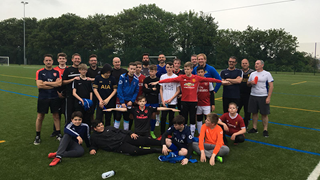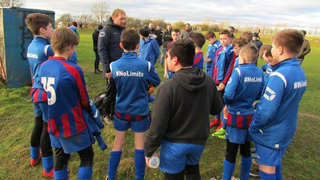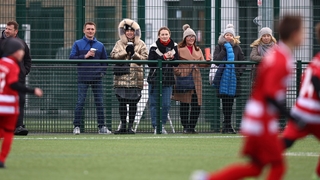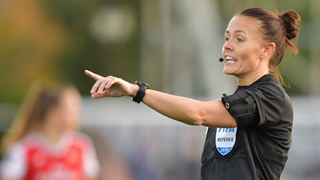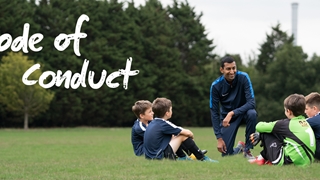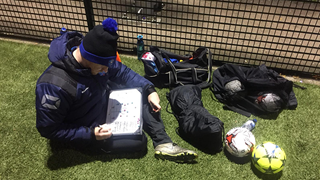
Whether you’re a parent or guardian, a player or a volunteer, what are the cornerstones of coaching that ensure whoever’s playing football gets the most positive experience from it, whatever their level? To support the launch of The FA's 'We only do positive' handbook by Gareth Southgate, Shaun Waite, Football Development Officer at Leicestershire County FA, shares his tips and guidance.
I’ve always wanted to be involved with my local grassroots club, so I contacted them to see if they needed a coach to run a team. I started by assisting an U10s teams for six months to gain some experience but then went on to coach a new U7 team at the club. From there I got the coaching bug. I went on to qualify as a Level 2 coach, completed the FA Youth Award and received support from our local FA Coach Mentor. Eight years later, I’m still with the same team and continue to observe other coaches to learn new ways of working.
Focusing on being positive and led by strong communication and collaboration are the cornerstones of my coaching philosophy. This echoes Gareth Southgate's positive principles of coaching in The FA's 'We only do positive' handbook, which I put into practice in the following ways:
1. Create the right environment
It’s crucial to make sure that the coaches, parents and players all work together in creating the right environment. At the start of the season we hold a parent’s evening where we introduce our philosophy booklet for the team which outlines four key areas:
- Be the most respectful team
- Provide opportunity for all
- Acceptance of mistakes
- Try to win, but never at the expense of the previous points.
Each player and parent will understand the expectations we have for the season, and how they can help us to make us a successful and respectful club that people enjoy being part of.
We’ve had examples of players becoming extremely anxious, both at and away from football, which has impacted their confidence in and around the team. In these examples we’ve made sure that our training sessions are a comfortable environment with no pressure on those players to perform.
We speak to their friends in the team and created a buddy system to ensure the player never feels alone during a training session or match. Their ‘buddy’ will meet them at the club entrance and ensure they’re not walking in alone; they’ll partner with them during drills and it’s built some true friendships and a comfortable, trustworthy environment that has been crucial for those players.
Fortunately these methods have ensured players continue to attend regularly, are enjoying their training sessions and are still at Ise Lodge YFC.
2. Lead by positive example
We begin the season with a player’s meeting to collectively agree the roles and responsibilities of the captain, understand the strengths and weaknesses of the team and the expectations for the season. The players will then decide their captain and vice-captain for the season, giving the players responsibility and confidence in their ability.
Once the captain is confirmed, myself and my assistant coach will sit down with them to discuss their role as leader, what that will entail and how we’ll support them. The captain will then work with me to lead the pre-match warm-up, the team talk before a game and provide feedback from the players at the end of the game.
One player who had been chosen as captain was beginning to feel the pressure of the responsibility he had. His mum expressed her concerns to us. We made the decision for the vice-captain to lead the match warm up instead, with the player who was feeling overwhelmed taking a step back and concentrating on positively leading the team.
I sat down with him and gave him some advice on how best to work with the team and the idea of leading by example. He realised there was no pressure and instead of feeling overwhelmed, he started coming to me for advice, listening to our team talks and taking in any points we had to make and reinforcing them in his role. His mum later mentioned how he had become more confident in himself and his role, which was great to see.
3. Build a positive team around you
We want to make sure our team at Ise Lodge YFC is a team people want to come and play for, so it’s really important to have a great team around you, including the players and their parents.
During the season we delegate roles and responsibilities to the team as well as the parents to ensure we’re all working together. Parents will arrive early to put the goalposts up, others will create the scorecards or organise social events, so it ensures there’s always a mutual understanding, discipline and respect across all levels.
Each player will also be delegated a role, for example the captain will lead the warm up, others will be asked to bring their strategic set piece to work on that week. Bringing everyone together makes the team more like a family.
I remember a player starting at the club and he’d joined because he’d been let go by another team. After a few training sessions we knew he had potential but sometimes lacked a bit of confidence in his ability. With this in mind, we made sure everyone in the team was supportive and encouraging him to be his best self and player, which meant he relaxed during training sessions and wasn’t so uptight.
He’s now become an essential part of the team, a real leader and one of the better players we have, which is great to see. I wasn’t going to give up on him. His mum recently mentioned the difference she’s seen in him and says it’s down to his love and determination to do well at the team, which is great to hear.
Download the 'We only do positive' handbookOn paper, a coaching philosophy can read well, but without support from parents/guardians it’s difficult to bring that philosophy to life. Parents play a vital role in creating a player-centred environment and it’s important to take them with you on the team’s journey. Through communication and collaboration the philosophy becomes more than a coach’s philosophy, it becomes the team’s philosophy, and therefore the impact is greater, leading to more consistent messages, increased enjoyment and greater player retention.
In the space of eight years the core of the team remains, with very few players dropping out. I’m confident that the culture of communication and collaboration within the team is playing a vital role to achieve this.
If there are young players out there who have always wanted to play but not quite made the leap, talk to your parents. Understand what’s holding you back and then find a coach and team who are going to put your needs first. If you find the right coach for you, they’ll help overcome any concerns you have. From there, you’ll start to find you’ll love the game, make friends and enjoy turning up every week for training and matches.
Football has so many benefits, look beyond the score line. Only one team can “win” the league, but every player can “win” through football, whether that’s making friends, improved confidence, developing leadership skills or achieving something they never thought they could. The right team, with the right coach, in the right environment means every player can “win”!
Shaun is featured in The FA's 'We only do positive' handbook, where Gareth Southgate details his five positive principles of coaching.


